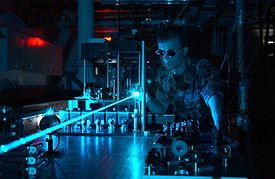Frozen light could bring quantum phones
 A team of physicists and engineers have bent one of the most basic laws of the universe – slowing down light to a complete stop for a full minute.
A team of physicists and engineers have bent one of the most basic laws of the universe – slowing down light to a complete stop for a full minute.
Normally a photon could travel about 18 million kilometres, 20 times around the moon, in the minute that the researchers managed to freeze it.
It is the latest in a series of experiments to manipulate the fastest character in the universe. Teams slowed down light to 17 metres per second in 1999, halted it completely in 2001 and froze it for 16 seconds earlier this year.
Professor George Heinze and colleagues at the University of Darmstadt, Germany, fired a control laser at an opaque crystal, sending its atoms into a quantum superposition of two states, making it transparent to a narrow range of frequencies. The team then froze a second beam that entered the crystal by turning off the first laser and thus, the transparency. The team tried many combinations of magnet and laser to dial in the minute-long cessation.
While currently quite conceptual, the technique does have potential applications in preserving communications data over incredible distances. The equipment could be combined with a device called a quantum repeater, which would stop and then re-emit photons used in secure communications, to preserve their quantum state over long distances.
The ground-breaking research has been published online.








 Print
Print